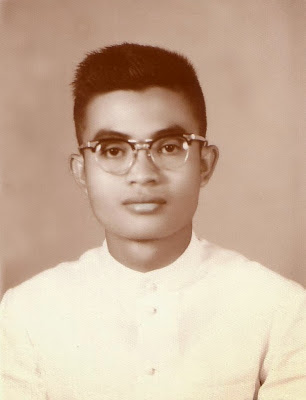 |
| Fr. Nelson Javellana, OMI |
Nelson, as close friends (he was one of my best friends) were wont to call him, was well liked by his fellow seminarians. He was a very generous person - with himself, his time and his talents. He was "always available" for anything. Those who wanted a quick hair cut got it from him during recreation time. Being highly intelligent, he helped those who were not as well gifted - to explain patiently a difficult philosophical or theological concept or to type and correct at the same time their term papers or reports, sometimes even up to midnight.
While doing his theological studies, Nelson took a leave of absence for personal reasons. He forthwith taught in the high school department of De La Salle College in Bacolod City. After a year, he transferred to the Oblate-run Notre Dame University in Cotabato City and taught mostly philosophy subjects. Two years later, he returned to the Oblate scholasticate in Quezon City and continued his theological studies. He was ordained to the priesthood in Bacolod City in April 11, 1971.
Thereafter, he worked in the Archdiocese of Cotabato as assistant parish priest of Esperanza then a part of the Municipality of Ampatuan. He was also the director of the high schools of Notre Dame of Esperanza and Notre Dame of Dukay.
 |
| Fr. Nelson Javellana, OMI |
In November 3, 1971, Nelson and a group of about 70 people from Esperanza went to Cotabato City in a convoy of several vehicles. This was for protection as the conflict between the Muslims and Christians was raging. Many of the men were also armed though not Nelson. They were to present a petition at a hearing to be presided by the national government's chairman of the Commission on Elections (Comelec). Previously, in a peace conference with the provincial governor, the Christian leaders of Esperanza drew up a petition for the transfer of the counting of ballots from the barrios to the town and to suspend voting in seven towns in the national and local elections which were about to be held. Nelson was a signatory of the petition.
When they arrived in Cotabato City, they were told that the Comelec chairman would be in the 5:00 PM plane. They waited for the plane and had a plane side conference with the Comelec chairman. They then proceeded to return to Esperanza.
While their baby bus was negotiating a bad, muddy and uphill portion of the highway in Tambunan, Dinaig, they were ambushed by an unidentified armed band. From both sides of the road they were sprayed with bullets from automatic weapons including 50 caliber machine guns. They were completely taken by surprise. Those who did not die from bullets were hacked to death. Nelson was one of the twelve men who died instantly. He sustained bullet wounds all over his body. All were divested of their personal valuables. The soldier who served as their security detail was stripped of his uniform, boots, garand rifle and ammunition.
The authorities said the ambush was politically motivated. The murderers were never identified.
Nelson was a priest for only seven months when he was killed. Then Father Provincial John Murphy OMI wrote in the Provincial Missive dated November 25, 1971 thus: "He was just beginning his priestly ministry with the promise of many long years of dedicated service ahead of him.... We can certainly say that he died because of his generosity to his friends. He felt justified in taking these risks...."
Fr. Nelson Javellana, OMI was the first member of the Philippine Province to die a violent death. Others were to follow some years later. In February 4, 1997, his classmate, Bishop Benjamin "Ben" de Jesus, was assasinated and in December 28, 2000, another Benjamin, Fr. "Benjie" Inocencio was killed in the same way. Both were shot in Jolo, Sulu in broad daylight. And like Nelson's case, theirs remain unsolved to this day.
These three Oblates had one thing in common: they all died in the service of the people and community they were sent to shepherd.

No comments:
Post a Comment